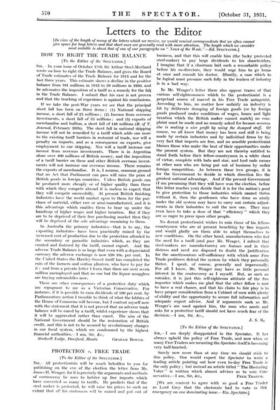PROTECTION v. FREE TRADE
[To the Editor of the SPECTATOR.] protectionists will be much beholden to you for publishing on the eve of the election the letter from Mr. James H. Weager, for it is precisely the arguments and methods of controversy he uses to bolster up free imports which have converted so many to tariffs. He predicts that if the steel maker is protected, he will raise his prices to such an extent that al! his customers will be ruined and put out of business, and that this will enable him (the lucky protected steel-maker) to pay large dividends to his shareholders. I imagine that if a chairman laid such a remarkable policy before his co-directors, they would urge him to go home at once and consult his doctor. Bluntly, a case which to be logical must presume such folly in the leaders of industry is in a bad way.
In Mr. Weager's letter there also appear traces of that curious self-righteousness which to the protectionist is a perpetual source of marvel in his Free Trade antagonist. According to him, no matter how unfairly an industry is hit by deliberate dumping of foreign goods (or by foreign goods produced under conditions of wages, hours and light taxation which the British maker cannot match) no com- plaint must be made and no remedy asked for because someone else is making a nice profit by using the dumped stuff. Of course, we all know that money has been and still is being made by certain industries and by individual firms by the very fact that imports are free, and no sensible protectionist blames those who make the best of their opportunities under the present system. But they are not thereby entitled to stand forth before their fellow-countrymen in a white sheet of virtue, complete with halo and star, and hurl rude names at other men who are being put out of business by unfair foreign competition. As between these two groups, it is for the Government to decide in which direction lies the greatest national advantage. And if the present Government (I am presuming that they will have won the election before this letter reaches you) decide that it is for the nation's good to give protection to those industries which cannot thrive without it, then the gentlemen who have done so nicely under the old system may have to carry out certain adjust- ments in their industries to suit the new one. They may even have to take a dose of that " efficiency " which they are so eager to press upon other people.
No decent protectionist wishes to ruin those of his fellow• countrymen who are at present benefiting by free imports and would gladly see them able to adapt themselves to new conditions. On the other hand, manufacturers who feel the need for a tariff (and pace Mr. Weager, I submit that steel-makers are manufacturers) are human and in their distress and need are disposed to doubt the justification for the sanctimonious self-sufficiency with which some Free Trade profiteers defend the system by which they personally thrive. I speak, of course, generally and impersonally. For all I know, Mr. Weager may have as little personal interest in the controversy as I myself. But, as such an outsider, it is just this self-righteous attitude of the free importer which makes me glad that the other fellow is now to have a real chance, and that his claim to fair play is to have proper consideration from a Cabinet of men with plenty of ability and the opportunity to secure full information and adequate expert advice. And if arguments such as Mr. Weager's are used against him, the man who needs and asks for a protective tariff should not have much fear of the decision.—I am, Sir, ece.,
J. S. R.






































 Previous page
Previous page